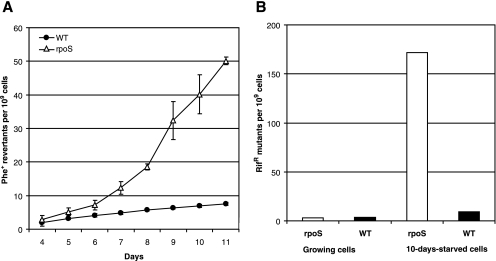FIG. 2.
Effect of RpoS on the frequency of base substitution mutations in P. putida under starvation conditions. (A) Accumulation of Phe+ revertants on phenol minimal plates in P. putida WT strain PaW85 and its rpoS-deficient derivative (rpoS) carrying plasmid pKTpheA22TAG. About 5 × 108 P. putida cells from independent cultures grown overnight in liquid M9 medium were plated onto phenol minimal plates. Data for at least five parallel experiments are presented. Means ± standard deviations (error bars) for 10 plates calculated per 1 × 109 cells are shown. (B) Frequency of Rifr mutants in growing cells and cells of P. putida WT strain PaW85 and its rpoS-deficient derivative starved for 10 days. The frequency of spontaneous Rifr mutations in 50 independent growing cultures of the P. putida WT strain and its rpoS-deficient derivative was calculated per 1 × 109 cells by using the Lea-Coulson method of the median (37, 63). The same cultures were plated onto phenol minimal plates, and after 10 days of starvation, the frequency of Rifr mutations was determined in the cells that survived the long-term starvation conditions. Median values for 10 plates calculated per 1 × 109 cells are shown. In total, 100 and 200 plates were examined for Rifr mutants in populations of the WT and its rpoS-deficient derivative, respectively.

